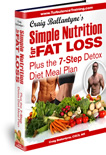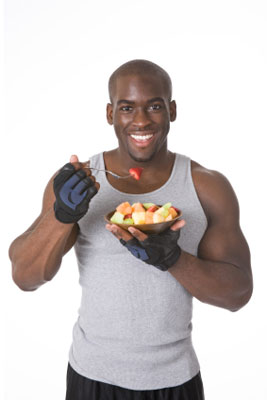The Best Diet for Six-Pack Abs
 If you’re frustrated and finally ready to reveal those six pack abs that are hiding underneath your layer of stubborn belly fat, then check out some of the tips I shared with callers in a recent abs and nutrition Q & A I did.
If you’re frustrated and finally ready to reveal those six pack abs that are hiding underneath your layer of stubborn belly fat, then check out some of the tips I shared with callers in a recent abs and nutrition Q & A I did.
What is the best and easiest nutrition regimen to get six pack abs?
Okay, if you haven’t watched the Simple Nutrition DVDs yet, here’s the answer to that question…
Simply get AWAY from non-real food.
I talk a little bit in the Simple Nutrition videos about the book I read by Michael Pollan, called “Food Rules”. In it and in one of his other books as well, he has his seven word diet, which I truly believe in.
And that is to simply, “Eat food, not too much, mostly plants.”
It couldn’t be any simpler than that. So, try not to overload on animal products because they will add up the calories a little bit faster than plants. You want to avoid eating processed foods, and instead you want to eat real, one ingredient foods.

You really want to have one ingredient foods whenever possible…
…that means an apple, one ingredient. It means maybe having a blender drink where you’re only adding one ingredient foods ie. fruits, raw nuts, flax meal, spinach, nut butters (which is just the nuts), that type of stuff.
By minimizing the number of ingredients in the foods you eat, you’ll soon find you’re much more full and satisfied on fewer calories. So, it’s a high volume diet, a higher volume of food.
One research study I base my nutrition stuff off is from 2007. In it they had two groups on low fat diets. However, one of the groups consumed more fruits and vegetables. Not surprisingly, the low fat fruits and vegetables group lost more weight, because they consumed a higher volume of food….
…just imagine having a plate full of vegetables in front of you – that’s a high volume of food for low calories. As a result, this test group didn’t consume too many calories at other meals.
So, it’s very important to eat real food, hopefully following the Simple Nutrition approach. Then use Dr. Mohr’s approach in which 90 percent of your carbohydrates come from fruits and vegetables and getting down to as low as 1,500 calories for weight loss.
But before you go to the 1,500 route, what I recommend is to find out how many calories you’re eating now. If you’re not losing weight improve the quality of your diet. Then if you still need to, decrease your calorie intake by 10 to 20 percent.
If you’re doing a 20 to 30 minute abs workout what’s the ideal pre and post training foods to take?
First of all, if you’ve read my stuff in the past then you should know there’s no need to be doing 20 to 30 minutes of abdominal training – there’s no such thing as an abs workout in my world.
Second of all, you DON’T have to FORCE post-workout nutrition, or even a pre-workout meal on your body.
If you’ve got enough mental energy to go and train you don’t need to force a pre-workout meal.
To be honest, a lot of pre and post-workout nutrition information comes from endurance athlete training studies… 
…if you’re doing a short-burst workout program it’s not like you’ve just gone and done a 120-minute cycle ride or a 90-minute run, which is where they’re doing this post-exercise high carb and pre-exercise carb eating to cycle longer. It’s just NOT THE SAME.
I know there have been resistance training studies showing six grams of essential amino acids before training is really effective for protein synthesis. Well, that’s fine…but that’s only six grams of essential amino acids, so maybe have a scoop of protein powder.
But most people are not training in a fasted state, and those people in those studies are getting up after having not eaten since 8:00 PM the night before and they’re taking this little mixture of essential amino acids and carbohydrates, then going and doing this very large difficult resistance training study where they do eight sets of eight to 10 repetitions on a leg press.
It’s still NOT EQUIVALENT to what most people are doing who are training at lunch time, or who are training after work.
If you’re training first thing in the morning and you’re getting up an hour early just to eat so you can train you don’t need do that.
It really comes down to common sense – Ask yourself, “Do I have mental energy, am I ready to go? Okay, I’m going to go train and I don’t have to worry about forcing food on myself if I’m trying to lose fat”.
That’s my opinion, and that’s Brad Pilon’s general opinion.
After training it’s the same thing…
Dr. Chris Mohr says there’s no need to force calories on overweight people after training like people have been promoting in the past. Taking that elite endurance athlete research and applying it to women and men who need to lose 50 to 60 pounds doesn’t necessarily make sense.
What about sports drinks for post nutrition, carb replenishing?
Sports drinks are terrible.
Basically, these drinks are nothing more than processed corn – a high fructose corn syrup, possibly glucose or dextrose or whatever is in there. But unless you’re running for 90 minutes straight or playing soccer or competitive basketball where you’re playing a 48 minute regulation game, you DON’T NEED sports drinks.
If you’re playing a 90 minute soccer game and you have a sports drink, yes it will help your performance. But, if you’re just doing a 20 minute workout then you don’t need a sports drink – it’s 20 minutes.
Let’s get away from the endurance athlete carbohydrate intake. Remember, endurance athletes are taking in like 5,000, 6,000, 7,000 or 8,000 calories per day. They’re entirely different animals than someone who wants to lose fat by training for 30 to 45 minutes three or four times per week.
So I hope this short nutrition and abs Q & A helped to clear up some common misconceptions floating around out there. Let me know if there’s anything else you’d like to know!